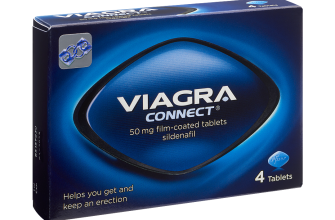Consult your healthcare provider before considering Viagra, especially if you have a history of stroke or cardiovascular issues. Recent studies suggest a connection between the use of sildenafil, the active ingredient in Viagra, and stroke risk, particularly in individuals with pre-existing health conditions. Awareness of these risks allows for informed decision-making about treatment options.
Research highlights that while Viagra effectively treats erectile dysfunction by increasing blood flow, it may lead to complications in certain patients. Specifically, those with hypertension or cardiovascular diseases may experience increased risk when using the medication. Monitor any changes in health and communicate openly with your doctor about potential side effects or concerns.
Consider lifestyle changes and alternative therapies that support sexual health without compromising cardiovascular safety. Regular exercise, a balanced diet, and managing stress can significantly reduce the likelihood of stroke, offering a holistic approach to health. Always prioritize safety first when exploring treatments for erectile dysfunction.
- Understanding the Connection Between Viagra and Stroke
- Overview of Viagra and Its Uses
- How Viagra Affects Blood Flow and Cardiovascular Health
- Potential Benefits
- Considerations for Use
- Risk Factors Contributing to Stroke in Viagra Users
- Clinical Studies on Viagra and Stroke Incidence
- Longitudinal Evidence
- Conclusions and Recommendations
- Signs and Symptoms of Stroke to Watch For
- Consulting Healthcare Professionals About Viagra Use
- Strategies for Safe Use of Viagra While Minimizing Stroke Risk
- Monitor Blood Pressure Regularly
- Stay Within Recommended Dosage
- Maintain a Healthy Lifestyle
- Educate Yourself
Understanding the Connection Between Viagra and Stroke
Research shows that Viagra, or sildenafil, does not increase stroke risk for most men who use it as prescribed. However, certain underlying health conditions can heighten this risk. Individuals with cardiovascular diseases should consult healthcare providers prior to usage, as they may face increased complications.
Having high blood pressure or other heart-related issues can create a connection between Viagra and a potential stroke. The medication can cause blood vessels to dilate, impacting blood pressure. Regular monitoring is crucial if you have pre-existing conditions.
It’s essential to remain aware of side effects such as headache, flushing, and dizziness. These symptoms may indicate changes in blood pressure, which can be significant for those with cardiovascular problems. Be proactive and discuss any concerns with your doctor.
Limit alcohol intake while using Viagra. Alcohol can exacerbate its side effects, leading to an increased risk of complications. Prioritizing a healthy lifestyle with proper diet and exercise can further mitigate stroke risk.
Always keep an eye on any unusual symptoms, like sudden headache or vision changes, and seek medical attention immediately if they occur. Timely intervention is key in preventing a serious event. Regular check-ups and clear communication with your healthcare provider will help maintain both sexual and overall health.
Overview of Viagra and Its Uses
Viagra, known generically as sildenafil, primarily treats erectile dysfunction (ED). It enhances blood flow to the penis, facilitating an erection in response to sexual stimulation. This medication is beneficial for men who experience difficulty achieving or maintaining an erection, providing a solution that enables a more satisfying sexual experience.
Besides ED, Viagra has FDA approval for pulmonary arterial hypertension (PAH). It helps relax blood vessels in the lungs, improving blood flow and reducing the strain on the heart. This application has shown positive results in increasing exercise ability and enhancing overall quality of life for patients with PAH.
It’s essential that individuals consult with healthcare providers before starting Viagra. A thorough evaluation ensures safety, particularly for those with underlying heart conditions or those taking certain medications. Potential side effects, such as headaches, flushing, or changes in vision, should be discussed as well.
Dosage varies based on the individual’s health and needs, typically starting at 50 mg taken approximately an hour before sexual activity. Adjustments can be made under the guidance of a healthcare professional. Viagra should not be taken more than once a day.
Storing Viagra at room temperature away from moisture and heat extends its shelf life, making it accessible when needed. Awareness of potential interactions, especially with nitrates, is critical to prevent serious complications.
How Viagra Affects Blood Flow and Cardiovascular Health
Viagra primarily works by increasing blood flow to the penis, but its effects extend beyond sexual function. The active ingredient, sildenafil, relaxes blood vessels, allowing for improved circulation throughout the body. This mechanism of action can impact cardiovascular health in various ways.
Potential Benefits
- Improved Coronary Blood Flow: Studies suggest sildenafil may enhance blood flow in coronary arteries, potentially benefiting patients with heart conditions.
- Lower Blood Pressure: The vasodilatory effects can lead to a modest reduction in blood pressure, offering advantages for those with hypertension.
- Better Exercise Capacity: Increased blood flow may improve exercise tolerance, particularly in patients with pulmonary arterial hypertension.
Considerations for Use
- Heart Conditions: Consult a doctor before use if you have a history of heart issues, as the medication can interact with certain cardiovascular drugs.
- Dosing: Adhering to prescribed doses is critical to avoid adverse effects such as sudden drops in blood pressure.
- Long-Term Effects: Ongoing research is necessary to fully understand the long-term implications of sildenafil on cardiovascular health.
Regular monitoring and medical guidance ensure safe use while leveraging the benefits of Viagra for enhanced blood circulation and potential heart health advantages. Always consult a healthcare provider before starting any new medication, particularly with underlying health conditions.
Risk Factors Contributing to Stroke in Viagra Users
Regularly assess your cardiovascular health if you’re using Viagra. One primary concern lies with underlying heart conditions, as individuals with hypertension or coronary artery disease may experience increased stroke risk when using this medication.
Age plays a significant role. Older users, particularly men over 65, tend to face higher stroke likelihood. Monitor your health closely and consult with a healthcare provider for personalized advice.
Medication interactions, particularly with nitrates, can heighten the chance of adverse effects. Always disclose all medications you’re taking to your doctor, ensuring they evaluate any potential risks associated with combining treatments.
Lifestyle factors significantly impact stroke risk. Address obesity, as excess weight can lead to high blood pressure and diabetes, both of which elevate stroke probabilities. A balanced diet and regular exercise contribute positively to your overall health.
Smoking is another critical risk factor. Cigarette use reduces blood flow and creates clots, increasing stroke risk. If you smoke, seek resources to help you quit.
Monitoring cholesterol levels also matters. High cholesterol can lead to atherosclerosis, increasing the risk of stroke. Regular check-ups can help manage this risk through diet and medication if necessary.
Lastly, managing stress effectively contributes to lower stroke chances. Engage in relaxation techniques, physical activity, or hobbies to reduce overall stress levels. Prioritizing mental well-being can support physical health.
Clinical Studies on Viagra and Stroke Incidence
Clinical studies indicate a minimal relationship between Viagra (sildenafil) and the incidence of stroke. Research involving diverse populations revealed no significant increase in stroke risk among men using Viagra. One notable study published in the Journal of the American College of Cardiology analyzed data from over 3,000 patients. It found no correlation between sildenafil use and higher stroke rates, suggesting that the medication does not adversely affect cerebrovascular health.
Longitudinal Evidence
A longitudinal study tracking patients for over five years highlighted similar findings. It demonstrated stable stroke rates in men with erectile dysfunction who used Viagra compared to those who did not. The research emphasized that factors such as age, hypertension, and diabetes played a more significant role in stroke risk than sildenafil use. Patients with preexisting conditions showed no uptick in cerebrovascular incidents directly linked to Viagra.
Conclusions and Recommendations
In light of current evidence, Viagra appears to be a safe option for men concerned about erectile dysfunction without significantly influencing stroke risk. Healthcare professionals should continue to assess individual patient health profiles, considering lifestyle factors and underlying conditions rather than solely focusing on the use of sildenafil. This approach ensures informed decision-making regarding the use of Viagra in treating erectile dysfunction.
Signs and Symptoms of Stroke to Watch For
Act quickly if you notice a sudden change in someone’s ability to speak, move, or understand. Speech may become slurred or difficult to comprehend. Ask them to repeat a simple phrase–if they struggle, it could indicate a stroke.
Observe their facial movements. One side of the face may droop when asked to smile. This can signal a potential stroke. Check if they can raise both arms equally; weakness or numbness on one side suggests action is needed.
Pay attention to coordination. If they stumble, have trouble walking, or seem dizzy, this could point to a stroke. A sudden headache with no known cause might also signal a serious issue. Seek immediate medical assistance if any of these symptoms appear.
Time is crucial. Knowing these signs allows for rapid responses and may save a life. Assess the situation and call for help without hesitation. Every minute counts in preventing lasting damage.
Consulting Healthcare Professionals About Viagra Use
Before starting Viagra, speak with your healthcare provider to assess its suitability for you. Understanding your medical history can help identify any potential risks associated with Viagra, particularly if you have pre-existing conditions such as heart disease or if you’re taking certain medications.
Request a thorough evaluation. Your doctor should review your overall health, current medications, and any past experiences with erectile dysfunction treatments. This discussion helps ensure that Viagra is safe for your use.
Share any side effects you’ve experienced from medications in the past. This information allows your provider to offer personalized advice and adjust dosages or suggest alternatives if necessary.
Discuss the timing and frequency of Viagra use. Your healthcare professional can guide you on whether to take it as needed or daily, considering your lifestyle and health status.
Ask about potential interactions with other drugs. Provide a complete list of all medications, including over-the-counter drugs and supplements, to avoid adverse reactions.
| Condition/Medication | Potential Interaction |
|---|---|
| Nitroglycerin | Increased risk of severe hypotension |
| Alpha-blockers | Risk of low blood pressure |
| Antidepressants | Possible effects on sexual function |
Inquire about lifestyle changes that could complement Viagra therapy. Discussing diet, exercise, and mental health can provide additional benefits for erectile function.
Establish a follow-up plan with your provider. Regular check-ins allow for tracking efficacy and managing any side effects effectively.
Strategies for Safe Use of Viagra While Minimizing Stroke Risk
Consulting with a healthcare provider before starting Viagra is critical. Full disclosure of medical history, including existing cardiovascular conditions, helps ensure safe usage.
Monitor Blood Pressure Regularly
Maintaining optimal blood pressure is essential. Incorporate regular monitoring into your health routine. Sudden drops or spikes can increase stroke risks.
Stay Within Recommended Dosage
- Adhere to the prescribed dosage to reduce side effects.
- Avoid alcohol and recreational drugs, as they may interact negatively.
- Don’t exceed the recommended frequency of use, generally not more than once a day.
Keep track of any side effects. Report issues like persistent headaches, dizziness, or chest pain to your doctor promptly.
Maintain a Healthy Lifestyle
- Engage in regular physical activity to enhance cardiovascular health.
- Eat a balanced diet rich in fruits, vegetables, and whole grains.
- Avoid smoking and limit alcohol intake to strengthen overall health.
Regular check-ups can help detect and manage any potential risk factors for stroke. Your doctor can guide you on lifestyle changes specific to your health needs.
Educate Yourself
- Learn about the potential side effects and interactions of Viagra.
- Stay informed on the latest research regarding ED treatments and stroke risks.
Empower yourself by understanding how medications like Viagra can affect your body. This awareness promotes safer usage and better health outcomes.





